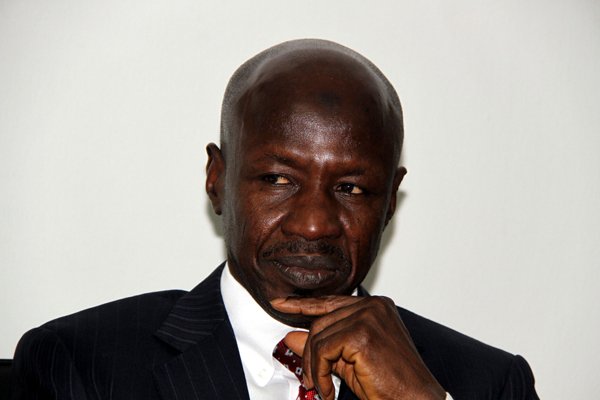Disaster for anti-corruption war
More than the personal fate of Ibrahim Magu, events of last week involving his arrest, detention, suspension from office, investigation by a judicial panel, his relentless media trial and his conviction in the court of public opinion are a disastrous turn of events for the Buhari Administration’s top campaign promise, the anti-corruption war. We had […]

More than the personal fate of Ibrahim Magu, events of last week involving his arrest, detention, suspension from office, investigation by a judicial panel, his relentless media trial and his conviction in the court of public opinion are a disastrous turn of events for the Buhari Administration’s top campaign promise, the anti-corruption war.
We had cause in the past to criticize the Administration’s lack of a comprehensive blueprint for fighting the anti-corruption war, the bedrock of President Muhammadu Buhari’s political appeal and the cornerstone promise of his five successive presidential campaigns, two of them successful.
In five years, the campaign was reduced to activities of the Economic and Financial Crimes Commission [EFCC] and some supporting agencies. EFCC too, was largely reduced in the public eye to the rambunctious style of its acting Chairman Ibrahim Magu.
EFCC under Magu managed in five years to bring to book some high-profile individuals and to bust many high-profile cases of public service fraud.
Top on the list were former Petroleum Minister Diezani Allison-Madueke, arms procurement money scandal centered around former National Security Adviser [NSA] Mohammed Sambo Dasuki as well as money laundering by top Jonathan Administration and PDP officials. High profile corruption cases still got stalemated in court, not always due to EFCC’s fault.
Three other accusations against Magu’s EFCC however stained the anti-corruption war. One was Magu’s fondness for media trial of suspects. Case files were copiously leaked to newspapers before they got to court, if they ever did.
Another was the charge that the war was selective.
Although EFCC thoroughly probed and exposed PDP’s 2015 campaign spending, nothing was ever heard of APC campaign spending, which was also huge.
Then also, there were widespread stories of corruption and shakedown of suspects by EFCC agents all over the country.
Serious allegations levelled against Magu himself, made by Attorney General and Minister of Justice Abubakar Malami, SAN, nailed the coffin.
The damning allegations include insubordination, selling seized assets to cronies and friends, favouritism towards selected EFCC investigators called ‘Magu Boys’, leakage of investigative reports to selected media houses, discrepancies in reconciliation of records of recovered funds between EFCC and Federal Ministry of Finance, not providing enough evidence against some suspects including Diezani Alison-Madueke, late action on investigation of P&ID leading to legal disputes and not respecting a court order to unfreeze a N7bn judgment in favour of a former bank executive director.
It prompted the president to institute an inquiry under the Tribunals of Inquiry Act. Curiously, the Justice Isa Ayo Salami panel is sitting in secret and it kept reporters at bay.
It also sent DSS operatives to apprehend Magu on the streets, a very clumsy thing to do. Magu has since been kept in detention at the Force CID and is fighting for bail.
No one should prejudge Magu, as he himself did to others. The probe should be thorough, fair and transparent. If he is found guilty, he should be prosecuted in an open court.
However, if these serious allegations turn out to be true, it will be a serious indictment of the anti-corruption war, of EFCC as an agency, of government’s slipshod procedure for handling and disposal of seized assets, and for President Buhari’s personal judgement and his monitoring of his key officials.
Magu was never confirmed by the Senate, as the EFCC Act expressly demands. The president however kept him in office in acting capacity for five years, with doubtful legality.
Much more seriously, he failed to keep a close tab on a man and an agency invested with so much power.
To wake up after five years and bring serious accusations against Magu, in effect saying recovered looted funds were re-looted, is an irony of historic proportions from which the Administration will find it very difficult to recover. But it must try to recover.
Whether Magu is cleared or not, the whole concept of the anti-corruption war and in particular the procedure for the handling of recovered assets must be reviewed and made much more transparent.
It is secrecy that enables atrocious deeds to be perfected. That the probe of Magu is also proceeding secretly suggests that no lessons have been learnt.
